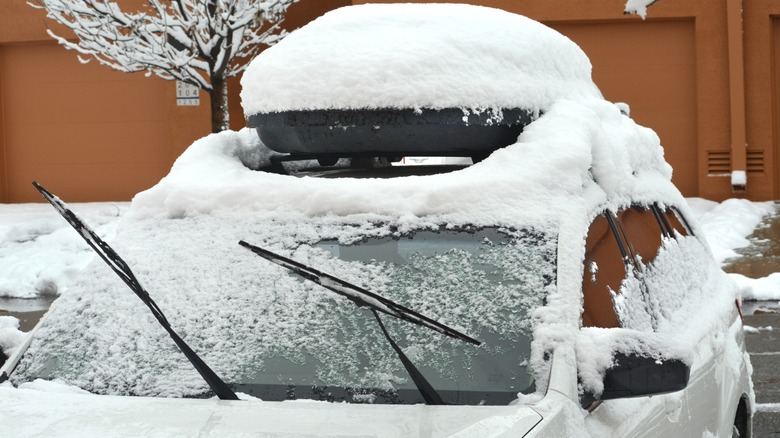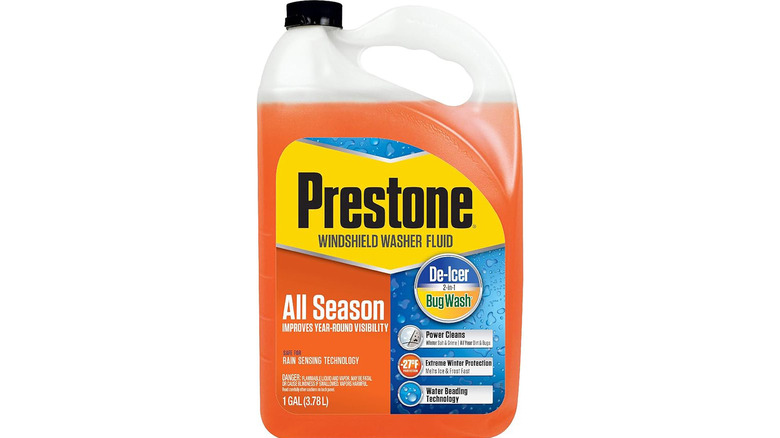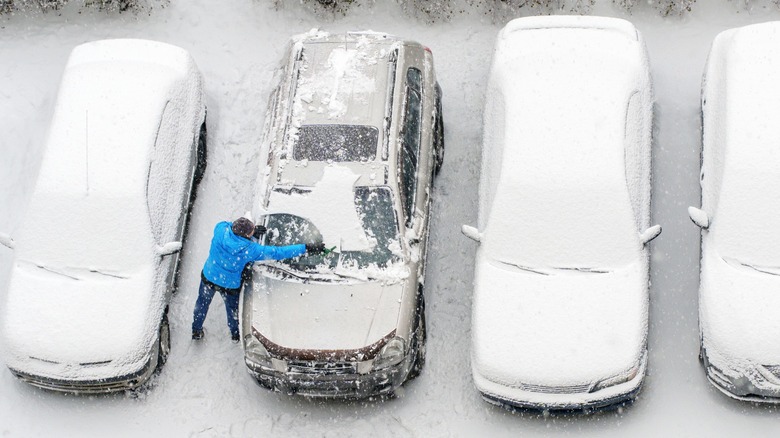Does Windshield Wiper Fluid Freeze? How To Care For Your Car In Cold Weather
We may receive a commission on purchases made from links.
Cold weather can wreak havoc on your car. Windshields can crack in cold weather, and temperature extremes can cause a variety of engine problems. Cars require a handful of different fluids to work properly, and they all are affected in some way by extreme cold.
Windshield washer fluid might not seem like as a big of a deal as motor oil, transmission fluid, or antifreeze, but it plays a huge role in keeping your vision clear and helping you drive safely. Washer fluid can freeze in extreme cold, preventing you from driving safely and damaging the components that make up this important but often neglected system.
It's important to know that washer fluid does not freeze instantaneously. As the temperature drops, the fluid first becomes slushy before solidifying. During this process, the fluid expands, putting pressure on the reservoir, nozzles, and rubber lines. In order to prevent serious damage, manufacturers design washer fluid reservoirs with extra space to handle possible expansion. However, it's not ideal to rely on this design allowance, and you can prevent this from happening.
Some washer fluids freeze at about the same temperature as water
How quickly your washer fluid freezes depends entirely on the type of fluid you're using. All-season washer fluid, which is mostly water mixed with basic cleaning agents, starts to freeze around 32 degrees Fahrenheit. This makes summer-grade fluid a risky choice in colder months since it can easily freeze as it sits in your system, potentially causing significant damage. While summer-grade fluids freeze close to water's freezing point, winter or all-season formulations contain additives that significantly lower the freeze point. Premium winter washer fluids are engineered to stay liquid in extremely low temperatures, with some remaining effective at -40°F.
You'll find this information printed on the container, often labeled "freeze point." If a bottle of washer fluid lacks this important information, it's safest to assume it's not meant for extremely cold temperatures. A good place to start is by researching the typical winter temperature range in your area. Then select a washer fluid rated for at least 20°F below those temperatures. This safety margin ensures your washer system will continue to work even if you experience a cold snap.
How to choose the right fluid for winter
While premium fluids may cost a bit more, they're worth it for the extra freeze protection. If you're unsure which one to pick, Amazon sells the Prestone all-season formula washer fluid shown above at a regular price of $20.75, although you can sometimes find it marked down a bit.
Another thing to put into consideration is how well a particular fluid actually cleans your windshield. Different types of wiper fluids are designed to meet various driving needs. The most common option is standard all-season fluid, which works well for cleaning dirt and grime in regular weather. However, if you're driving in colder climates, de-icer wiper fluid is a better choice. It usually contains alcohols like ethanol to prevent freezing and melt ice quickly. Since driving in winter often leaves your windshield covered in road salt, slush, and stubborn grime, it's a good idea to choose fluids labeled as "winter" or "de-icer" for the best results. Some of these formulas contain surfactants, which are chemicals that reduce the surface tension of a liquid, making them more effective cleansers.
Finally, try to stock up on enough washer fluid to last the entire winter season. If you run out during a snowstorm, you might be forced to rely on whatever's available at a gas station. You might be limited to summer fluids, or there could be no options on the shelf. So, having an extra bottle or two in your trunk could save you some hassle.
What can you do if your wiper fluid freezes?
So, what can you do if your washer fluid is already frozen? First, don't try to force the system to work. If you do, you could damage the washer pump or lines, and that'll only lead to unnecessary and possibly expensive repairs. Instead, focus on thawing and restoring your system.
The safest and most effective solution is to move your car into a heated garage and let it warm up slowly for a few hours. If you don't have access to a garage, then you can park your car, leave the engine on, and let it idle for a few minutes so the heat of the engine can help thaw the wiper fluid. If that doesn't work, you may use a hair dryer, but be very careful. If you can get it close enough to your car, point it at the wiper reservoir and lines and the warm air should help defrost the fluid. However, avoid using quick fixes like pouring hot water into the reservoir or using a heat gun. These methods can cause cracks or damage to the plastic and rubber parts.
Once the fluid has thawed, flush the system with a little winter-grade washer fluid to clear out any leftover summer-grade solution. Finally, refill the reservoir with winter-grade washer fluid that's rated for the coldest temperatures in your area.
What to do if you're storing your car for the winter
If you're not planning to use your car during winter, you have to store it the right way. The first step is choosing the right storage location. Ideally, your best choice is a dry garage that stays warm. If you can't store it indoors, get a high-quality car cover that's waterproof and breathable. Make sure the cover fits well to stop moisture from getting trapped underneath. You don't want to give rust and mold a chance to grow in your car.
Before you store your car, clean it inside and out. Wash and wax the outside to protect the paint, and vacuum the inside to remove dirt or food crumbs that might attract rodents or make the car smell bad later.
Furthermore, remember that your car's battery needs extra care in winter, especially if it will be inactive for a while. Cold weather can drain it fast, so if you can, connect it to a battery tender or maintainer. This device keeps your battery charged without overloading it. If you can't use a tender, take the battery out and store it in a warm, dry place.
Finally, protect your car from rodents. One helpful tactic is to block the tailpipe and any small openings with steel wool. You can also place dryer sheets or mothballs around your car to keep pests away. Just make sure you remember to remove all these items before starting the car in the spring.
Other essential winter car care tips
If you plan to drive your car in the winter, there are a few measures you should take when the weather starts to change. Check your tire pressure every week in winter because cold air makes tire pressure drop. Maintain the pressure recommended in your owner's manual, not the maximum pressure listed on the tire sidewall. If you live in an area with regular snow and ice, consider investing in winter tires. Unlike all-season tires, winter tires use special rubber compounds that remain flexible in cold temperatures and generally make them last longer.
You'll also want to check your antifreeze. This liquid helps stop your engine from freezing and keeps it from overheating. Most car manufacturers suggest using a 50/50 mix of antifreeze and water for optimal performance. If you're not sure about the mixture currently in your car, drain and refill it with the change of seasons.
To make sure you can see well, confirm that all your car's lights work, including headlights, brake lights, and turn signals. Clean cloudy headlights and replace windshield wipers that are streaking or not clearing properly. Don't forget your brakes, either. If you hear strange noises when braking, you may need to replace your brake pads. Get them checked before winter arrives.
Ultimately, getting your car ready for winter is all about being proactive rather than reactive. When you keep up with a regular maintenance schedule, you'll avoid major issues and stay safe on the road during the cold months.





